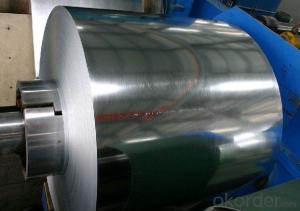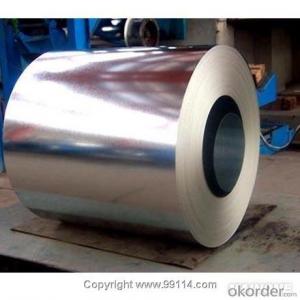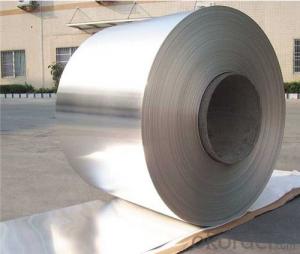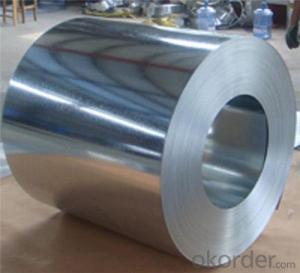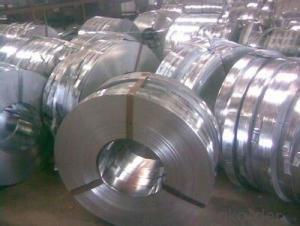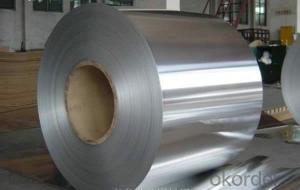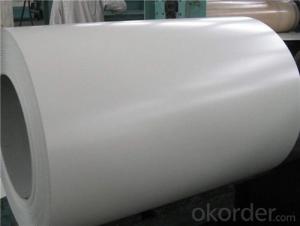Al-Zinc Coated steel oil For construction Roof
- Loading Port:
- Shanghai
- Payment Terms:
- TT OR LC
- Min Order Qty:
- 25 m.t.
- Supply Capability:
- 30000 m.t./month
OKorder Service Pledge
OKorder Financial Service
You Might Also Like
Structure of Al-Zinc coated steel coil
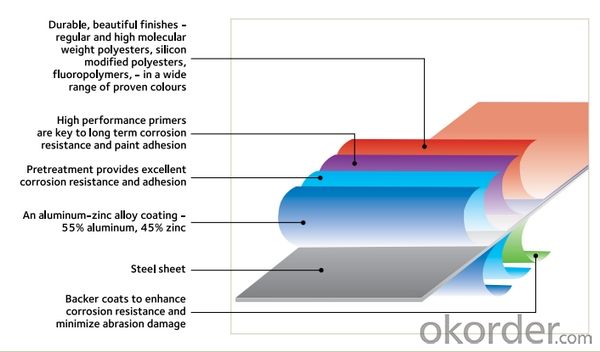
Description of Aluminum Zinc Rolled Coil
The detailed information for the Al-Zinc coated steel coil is as following and it is mainly using for roofing producing, making ceiling grid and all kinds of roll forming structure.
Thickness: 0.20mm to 1.20mm
Width: 914mm, 1000mm, 1200mm, 1219mm and 1250mm, or slit narrow strip according to customer request, can be slit from 20mm to 610mm.
Coil ID: 508mm
Coil weight: 3 tons to 6 tons
Thickness tolerance: +/- 0.02mm or according to customer request.
Main Feature of Al-Zinc coated steel coil
1.Corrosion resistance: It mainly depends on the aluminum protection. When the zinc being worn, the aluminum will form a dense layer of aluminum oxide, resist corrosion material to prevent further corrosion inside.
2. Heat resistance: Aluminum zinc alloy steel sheet has excellent heat resistance, can withstand high temperatures over 300 centigrade, and is similar with aluminized steel high temperature oxidation resistance. It often used in chimney pipes, ovens, fluorescent lighting device and the device cover.
3. Heat reflective: Galvanized steel plate heat-reflective high rate is twice as galvanized steel, often used to make insulation materials.
4. Economy: Because density of 55% AL-Zn is smaller than the density of Zn, so in the same weight and thickness of Galvanized zinc layer, aluminum-zinc steel plate is larger area more than 3% of galvanized steel sheet.
Applications of Al-Zinc coated steel coil
1. Construction and building: roofing; ventilating duct; handrail; partition panel;etc.
2. Electric appliance: refrigerator; washing machine; refrigerator; DVD;etc.
3.Transportation: oil tank; road sign; etc.
4.Agriculture:barn; etc.
5.Others:vending machine; game machine; etc.
Specifications of Al-Zinc coated steel coil
Prepainted galvanized steel coil ( PPGI ) | Prepainted galvalume steel coil ( PPGL ) | |
Standard | JIS G3312 CGCC | J IS G3322 CGLCC |
Valid thickness | 0. 16 ~1. 2 0mm | 0. 16 ~1. 2 0mm |
Coil width | 600~1250mm | 600~1250mm |
Coil ID | 508mm & 610mm | 508mm & 610mm |
Coil weight | 3~5 tons | 3~5 tons |
Coating | 4 0~275 g/m2 | AZ30 to AZ150 |
Paint t hickness , top side | 15~25 microns | 15~25 microns |
P aint t hickness , reverse | 5~7 microns or 15~25 microns | 5~7 microns or 15~25 microns |
Color | any RAL code | any RAL code |
Package | vertical, eye to sky & horizontal | vertical, eye to sky & horizontal |
MOQ | 25 tons | 25 tons |
FAQ of Al-Zinc coated steel coil
We have organized several common questions for our clients,may help you sincerely:
1. What is the minimum order quantity ?
Our MOQ is 50mt for each size. And we will consider to give more discount if you make big order like 1000 tons and more. Further more, the more appropriate payment term your offer the better price we can provide.
2. How long can we receive the product after purchase?
Usually within thirty working days after receiving buyer’s advance payment or LC. We will arrange the factory manufacturing as soon as possible. The cargo readiness usually takes 15-25 days, but the shipment will depend on the vessel situation.
3. How to guarantee the quality of the products?
We have established the international advanced quality management system,every link from raw material to final product we have strict quality test;We resolutely put an end to unqualified products flowing into the market. At the same time, we will provide necessary follow-up service assurance.
- Q: Hello,I have been thinking about buying a Tungsten Carbide Diamond wedding band for my husband but one of my family members keep telling me that Tungsten Carbide is merely steel and hence, a low quality metal, therefore, I shouldn't buy it. I don't really know much about it. Please if anyone can tell me more about this metal? Thanks.
- Tungsten is not steel. Tungsten is a chemical element. What they do is add an alloy mixture to tungsten and it turns into Tungsten Carbide. You want to find a ring with a nickel alloy, some manufacturers cheap out and add cobalt instead. Make sure the ring you buy does not contain cobalt. Steel is an alloy consisting mostly of iron, with a carbon.
- Q: How do steel coils contribute to sustainable construction?
- Steel coils contribute to sustainable construction in several ways. Firstly, steel is a highly durable material that can withstand extreme weather conditions and resist corrosion, leading to longer-lasting structures. This durability reduces the need for frequent repairs and replacements, thereby reducing waste and conserving resources. Secondly, steel is a recyclable material, meaning that at the end of a building's life cycle, the steel used in its construction can be easily and efficiently recycled. This reduces the demand for new steel production, which is energy-intensive and releases greenhouse gases. By using steel coils made from recycled steel, the construction industry can significantly reduce its environmental impact. Additionally, steel coils are versatile and can be shaped and formed into various structural components, allowing for efficient use of materials and minimizing waste. The lightweight nature of steel coils also makes transportation and handling more cost-effective and environmentally friendly. Furthermore, using steel coils in construction can contribute to energy efficiency. Steel has excellent thermal conductivity, which means it can effectively transfer and distribute heat, enabling better insulation and reducing energy consumption for heating and cooling. Overall, steel coils play a vital role in sustainable construction by promoting durability, recyclability, efficient material usage, and energy efficiency.
- Q: were iron age weapons made of steel?
- Even in very early iron, a small amount of steel was produced by carburization, where the iron picks up carbon by laying in hot coals before quenching. This produces a thin layer of steel on the surface of the iron. By about 300 BC Damascus steel was being produced by the crucible method on the Indian subcontinent, and the Romans used steel from Noricum. In the first century BC the Chinese were melting cast iron and wrought iron together to make steel.
- Q: 2 refridgerator of similar model and same brand..one is stainless steel...the other is clear steel (cheaper)..so wat's the difference between the two?
- Stainless steel is different than regular (clear?) steel because is is an alloy, or combination, of steel and other elements. Stainles steel has 15% chromium, which is very resistant to rust than regular steel. That is why stainless is more expensive
- Q: How are steel coils used in the production of industrial storage tanks?
- Steel coils are commonly used in the production of industrial storage tanks due to their superior strength and durability. These coils are typically made from high-quality steel that is rolled into a coil shape, allowing for easy transportation and handling. In the production process, steel coils are first uncoiled and flattened to create sheets of steel. These sheets are then cut and formed into the desired shape and size for the storage tank. The steel sheets are welded or bolted together to create the tank's body, which is designed to withstand high pressure and heavy loads. The use of steel coils in the production of industrial storage tanks offers several advantages. Firstly, the strength and durability of steel ensure that the tanks can withstand harsh conditions and are resistant to corrosion. This is particularly important for storage tanks that may contain corrosive substances or be exposed to harsh environments. Additionally, the flexibility of steel coils allows for customization of the tank's design and size. This is particularly beneficial in industries where storage requirements can vary significantly, such as the oil and gas industry. Steel coils can be easily cut and formed into various shapes and sizes, enabling the production of storage tanks that meet specific storage needs. Furthermore, steel coils can be easily transported and stored, making them a cost-effective choice for the production of industrial storage tanks. The coils can be efficiently transported to the manufacturing facility, reducing transportation costs and logistical complexities. Overall, steel coils play a crucial role in the production of industrial storage tanks by providing strength, durability, and customization options. Their use ensures that the tanks can safely store and protect various substances, making them essential for a wide range of industries.
- Q: Can anyone please tell me what is the DUCTILE TO BRITTLE TRANSITION TEMPERATURE IN STEEL LOW CARBON?Thanks.
- The temperature varies with the type of low carbon steel and how it is heat treated. Common structural steel actually have a transition temperature as defined by Charpy impact tests to be in the 50 degree range. Most low carbon steel pipe such as ASTM A53, A106 and pressure vessel plate such as A212, a515 also have 50 degree range Charpy test results. If you look at materials with fine grain such A516 plate, A300 pipe and similar materials then the transition temperature drops to around -50 degrees. The thing to remember is in addition to the transition temperature you also have to have the material at a high stress level, a stress riser such as a notch and then the sudden application of additional stress to get an actual brittle fracture failure. That is why bridges make from common structural steel don't fail at temperatures as low as -40 degrees.
- Q: I was curious to what type of steel I should get if I wanted something that kept its edge longer than 154cm but is still just as stainless. I don't know much about knife steels inform me please?
- 154cm is a very good knife steel, the problem is in the heat treating. Stainless should be cryo treated to get all it can offer. That being said, if you really want to drop some coin, look at getting one made from CPM 440V. Stainless isn't as strong as carbon but on a smaller knife works well. You might also look for D-2 Tool steel. There are factory knives that are made of that.
- Q: what are the characteristics when of iron or steel when stretched? which one could be stretched further? which one stretches more evenly?thankyou
- Technically, this is known as ductility. a material which can be permanently bent and stretched is said to be ductile. Pure iron, when it lacks carbon and impurities like sulfur and phosphorus, is relatively soft, ductile, and weak. It's about as soft as brass. It can be stretched to about 50% of it's original length before it breaks. The amount a sample can be stretched without breaking is known as elongation. The key to steel is the addition of about 2 parts per thousand of carbon, or around 0.2%. This alters the crystal structure and makes steel much harder, stronger, and tougher, though it also becomes somewhat less ductile. Mild steel, with a low carbon content, has an elongation of around 30% Adding more carbon makes the steel yet stronger, but further reduces the elongation. Adding more than 2-3% carbon produces what is known as Cast Iron. Cast iron is brittle. It has virtually no ductility. It's pretty cheap to produce though.
- Q: What are the safety considerations when handling steel coils?
- When handling steel coils, there are several safety considerations that should be taken into account. Firstly, it is essential to wear appropriate personal protective equipment (PPE) such as gloves, safety glasses, and steel-toed boots. This protective gear helps to minimize the risk of injuries from sharp edges, flying debris, or accidental contact with the coils. Secondly, it is important to have a clear understanding of the weight and dimensions of the steel coils being handled. Steel coils can be extremely heavy, and improper lifting techniques can result in back strains, muscle pulls, or even more severe injuries. Therefore, it is crucial to use proper lifting techniques, such as bending the knees and keeping the back straight, or utilizing lifting equipment like cranes or forklifts when necessary. Additionally, steel coils can be unstable and prone to rolling or shifting during handling. To prevent accidents, it is crucial to secure the coils properly before moving or stacking them. This can be done by using appropriate lifting attachments, banding the coils together, or utilizing racks or other storage systems specifically designed for steel coils. Furthermore, it is important to be aware of the potential hazards associated with the steel coils, such as sharp edges, oil or grease coatings, or even damage to the coils themselves. It is essential to inspect the coils for any abnormalities or defects before handling them, as well as ensuring that they are stored in a safe and stable manner to prevent accidents. Lastly, proper communication and training are essential when handling steel coils. It is crucial to establish clear communication channels between workers to ensure that everyone is aware of their roles and responsibilities. Additionally, providing training on safe handling techniques, potential hazards, and emergency procedures can help minimize the risk of accidents and injuries. In conclusion, when handling steel coils, it is important to wear appropriate PPE, use proper lifting techniques, secure the coils properly, be aware of potential hazards, and ensure proper communication and training. By following these safety considerations, the risk of accidents and injuries can be significantly reduced.
- Q: What is the process of recoiling steel coils?
- The process of recoiling steel coils involves uncoiling the steel coil, straightening any bends or kinks, and then rewinding it into a tighter coil, ready for further processing or transportation.
Send your message to us
Al-Zinc Coated steel oil For construction Roof
- Loading Port:
- Shanghai
- Payment Terms:
- TT OR LC
- Min Order Qty:
- 25 m.t.
- Supply Capability:
- 30000 m.t./month
OKorder Service Pledge
OKorder Financial Service
Similar products
Hot products
Hot Searches
Related keywords
